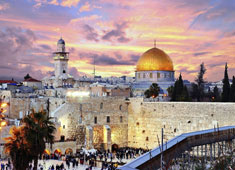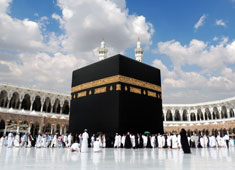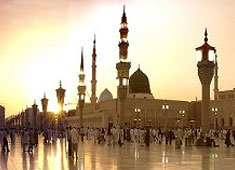Qurbani (Udhiya) and Hadi
Qurbani (Udhiya) is traced back to the performance of the father of prophets Abraham. it commemorates his willingness to sacrifice his son, who was replaced by an animal at the time of sacrifice. It is a sacrifice offered at the time of Eid-Ul-Adha to express gratitude towards Allah and to feed the poor and needy. |  |
Muhammad (peace and blessings of Allah be upon him) was once asked by his Companions: "O Prophet of Allah! What is this qurbani?" He replied, "It is the Sunnah of your father Ibrahim." (Ibn Majah)
Qurbani (Udhiya) is a practice commanded by Allah and it is a prescribed duty for each sane, resident (not a traveller), and mature Muslim. However, if a traveler who makes intention to stay at a certain place for fifteen days or more, he/she no longer remains a traveler. He/she must sacrifices Qurbani if he/she possesses the prescribed amount. He/she has to possess the amount of fifty two and half tolas of silver (612-36 grams) or equivalent wealth to that value which is in excess of one's basic needs. Qurbani is not obligatory on a child or an insane person.
The days of Qurbani (Udhiya) are the tenth, eleventh and twelfth of Dul-Hijjah. Qurbani (Udhiya) is not permissible before The Eid prayer, therefore, its time starts after Eid prayer on the 1Oth of Dul-Hijjah until the sunset of 12th Dul-Hijjah. "Whoever slaughtered his sacrifice before he prays, let him slaughter another one in its place, and whoever did not slaughter a sacrifice, let him do so in the name of Allah." [Muslim (3621)]
The Qurbani (Udhiya) can be a goat or she-goat, sheep of all kinds, cow, bull, buffalo or camel.
Qurbani’s age, male or female, should be as follows:
A sheep must be aged at least 6 months. A cow must be aged 2 years at least and a camel must be aged 5years at least. It is worth noting that animals that are blind, one-eyed cannot be used as Qurbani.
It is not obligatory to say the intention (Niyah which consists of saying ”Bismallah Allaho akbar”), loudly when slaughtering the animal. It is preferable to slaughter one’s Qurbani alone; however if one does not know how to do so, he has to be present when someone else is slaughtering the animal.
In this frame, it is necessary to distinguish between Hadi and Qurbani. The difference between them is that Hadi refers to the sacrifice offered by Hajj pilgrims in Mecca, however Qurbani ( Udhiya) refers to the sacrifice offered by (non-pilgrims) Muslims. Hadi is the sacrifice offered for Allah’s sake in Mecca between the 10th and 13th of Dhul-Hijja.
272












 TUNIS
TUNIS Casablanca
Casablanca




 Algeria
Algeria France
France Morocco
Morocco Saudi Arabia
Saudi Arabia Tunisia
Tunisia